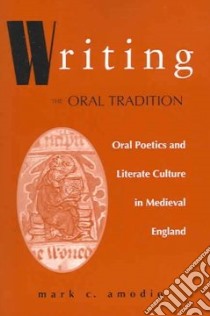Writing The Oral Tradition - 9780268020248
Un libro in lingua di Mark Amodio edito da Univ of Notre Dame Pr, 2004
- € 23.10
- Il prezzo è variabile in funzione del cambio della valuta d’origine
"This is a splendid, rewarding book destined to reshape critical thinking about medieval poetry in English. Amodio combines groundbreaking theory with a deep, wide-ranging command of relevant scholarship to offer a uniquely inclusive perspective on an enormous and disparate collection of Old and Middle English poetry." —John Miles Foley, University of Missouri, Columbia
“This is a well-conceived, well-structured, and well-written book that fills a significant gap in current scholarly discourse. Amodio is extremely well-informed about current oral theory, and presents a beautifully integrated thesis. This clear-sighted and provocative book both promises and delivers much.” —Andy Orchard, University of Toronto
Mark Amodio's book focuses on the influence of the oral tradition on written vernacular verse produced in England from the fifth to the fifteenth century. His primary aim is to explore how a living tradition articulated only through the public, performance voices of pre-literate singers came to find expression through the pens of private, literate authors. Amodio argues that the expressive economy of oral poetics survives in written texts because, throughout the Middle Ages, literacy and orality were interdependent, not competing, cultural forces. After delving into the background of the medieval oral-literate matrix,Writing the Oral Tradition develops a model of non-performative oral poetics that is a central, perhaps defining, component of Old English vernacular verse. Following the Norman Conquest, oral poetics lost its central position and became one of many ways to articulate poetry. Contrary to many scholars, Amodio argues that oral poetics did not disappear but survived well into the post-Conquest period. It influenced the composition of Middle English verse texts produced from the twelfth to the fourteenth century because it offered poets an affectively powerful and economical way to articulate traditional meanings. Indeed, fragments of oral poetics are discoverable in contemporary prose, poetics, and film as they continue to faithfully emit their traditional meanings.
“This is a well-conceived, well-structured, and well-written book that fills a significant gap in current scholarly discourse. Amodio is extremely well-informed about current oral theory, and presents a beautifully integrated thesis. This clear-sighted and provocative book both promises and delivers much.” —Andy Orchard, University of Toronto
Mark Amodio's book focuses on the influence of the oral tradition on written vernacular verse produced in England from the fifth to the fifteenth century. His primary aim is to explore how a living tradition articulated only through the public, performance voices of pre-literate singers came to find expression through the pens of private, literate authors. Amodio argues that the expressive economy of oral poetics survives in written texts because, throughout the Middle Ages, literacy and orality were interdependent, not competing, cultural forces. After delving into the background of the medieval oral-literate matrix,Writing the Oral Tradition develops a model of non-performative oral poetics that is a central, perhaps defining, component of Old English vernacular verse. Following the Norman Conquest, oral poetics lost its central position and became one of many ways to articulate poetry. Contrary to many scholars, Amodio argues that oral poetics did not disappear but survived well into the post-Conquest period. It influenced the composition of Middle English verse texts produced from the twelfth to the fourteenth century because it offered poets an affectively powerful and economical way to articulate traditional meanings. Indeed, fragments of oral poetics are discoverable in contemporary prose, poetics, and film as they continue to faithfully emit their traditional meanings.
Informazioni bibliografiche
- Titolo del Libro in lingua: Writing The Oral Tradition
- Sottotitolo: Oral Poetics And Literate Culture In Medieval England
- Lingua: English
- Autore: Mark Amodio
- Editore: Univ of Notre Dame Pr
- Collana: Univ of Notre Dame Pr (Paperback)
- Data di Pubblicazione: 01 Ottobre '04
- Genere: LITERARY CRITICISM
- Argomenti : English poetry Middle English, 1100-1500 History and criticism Written communication England History To 1500 Oral communication England History To 1500
- Pagine: 298
- Dimensioni mm: 222 x 152 x 25
- ISBN-10: 0268020248
- EAN-13: 9780268020248


